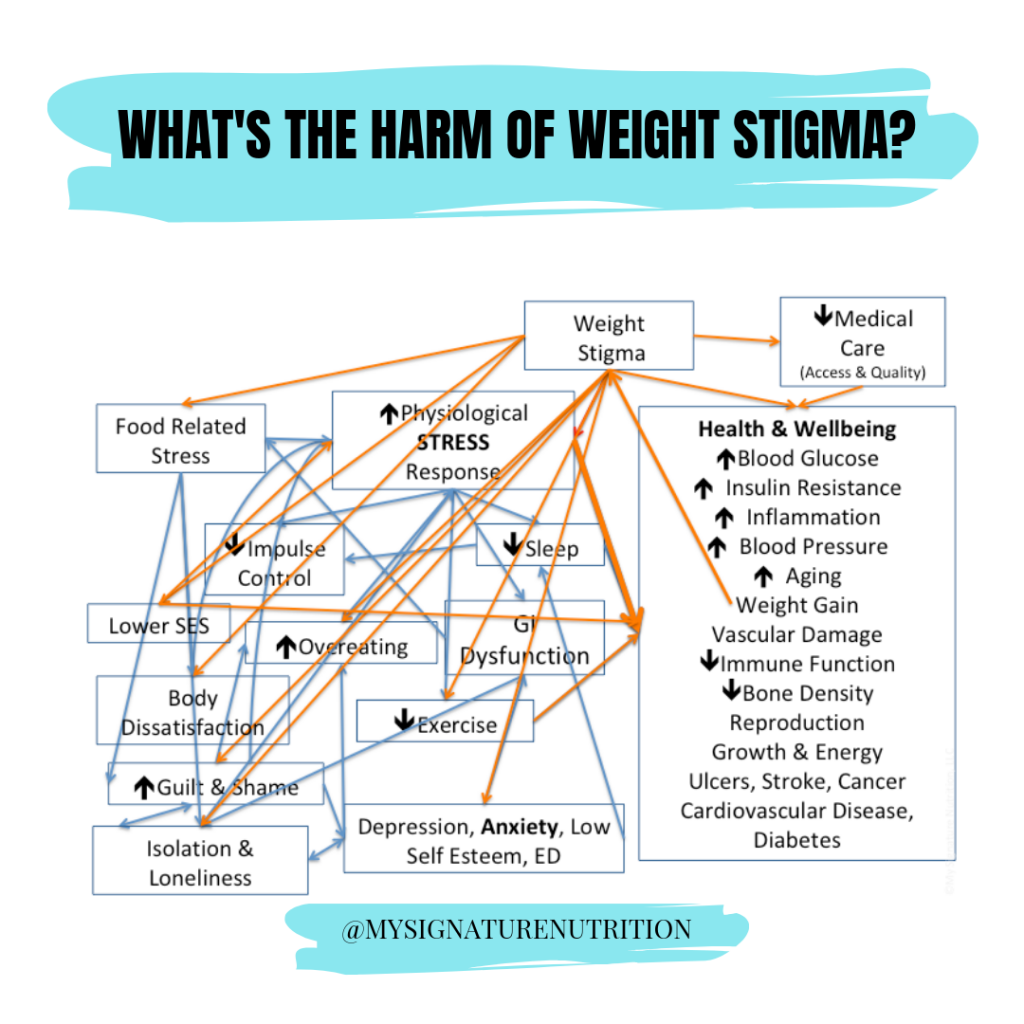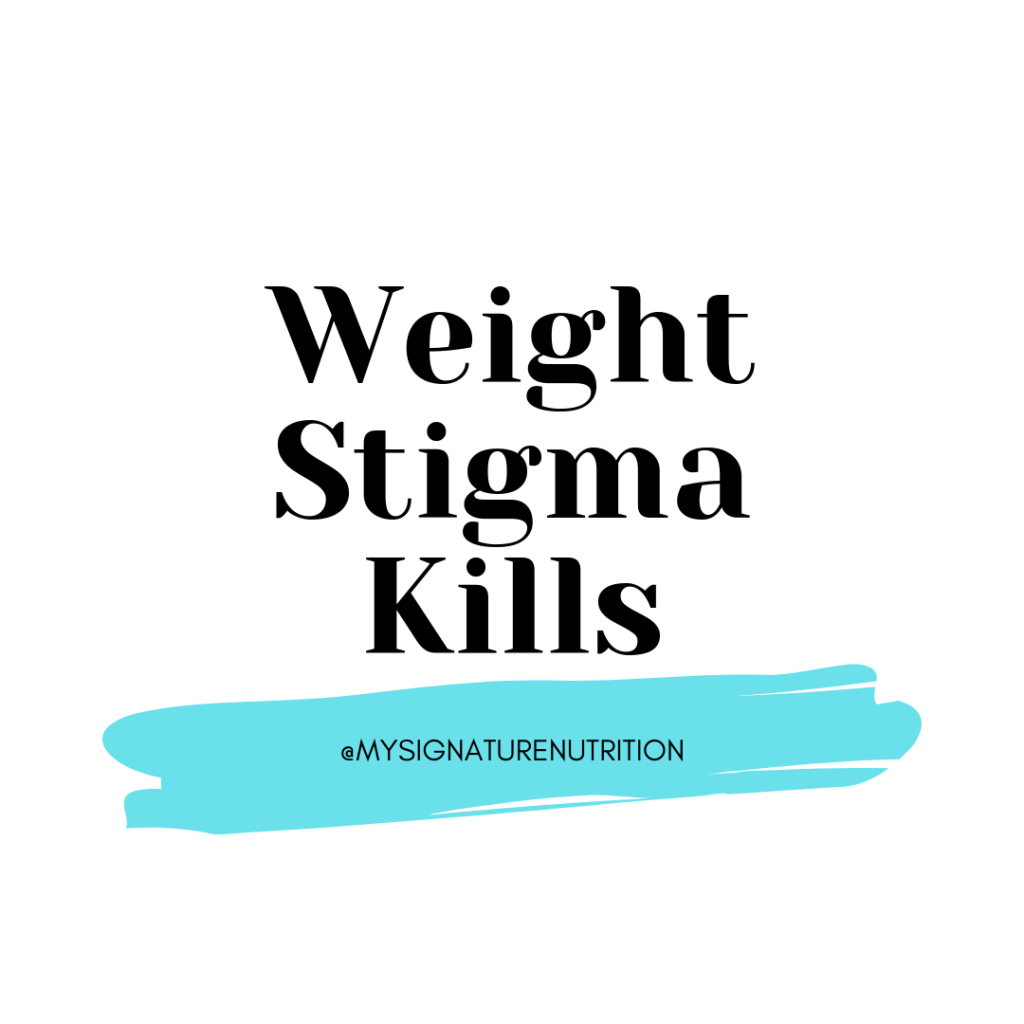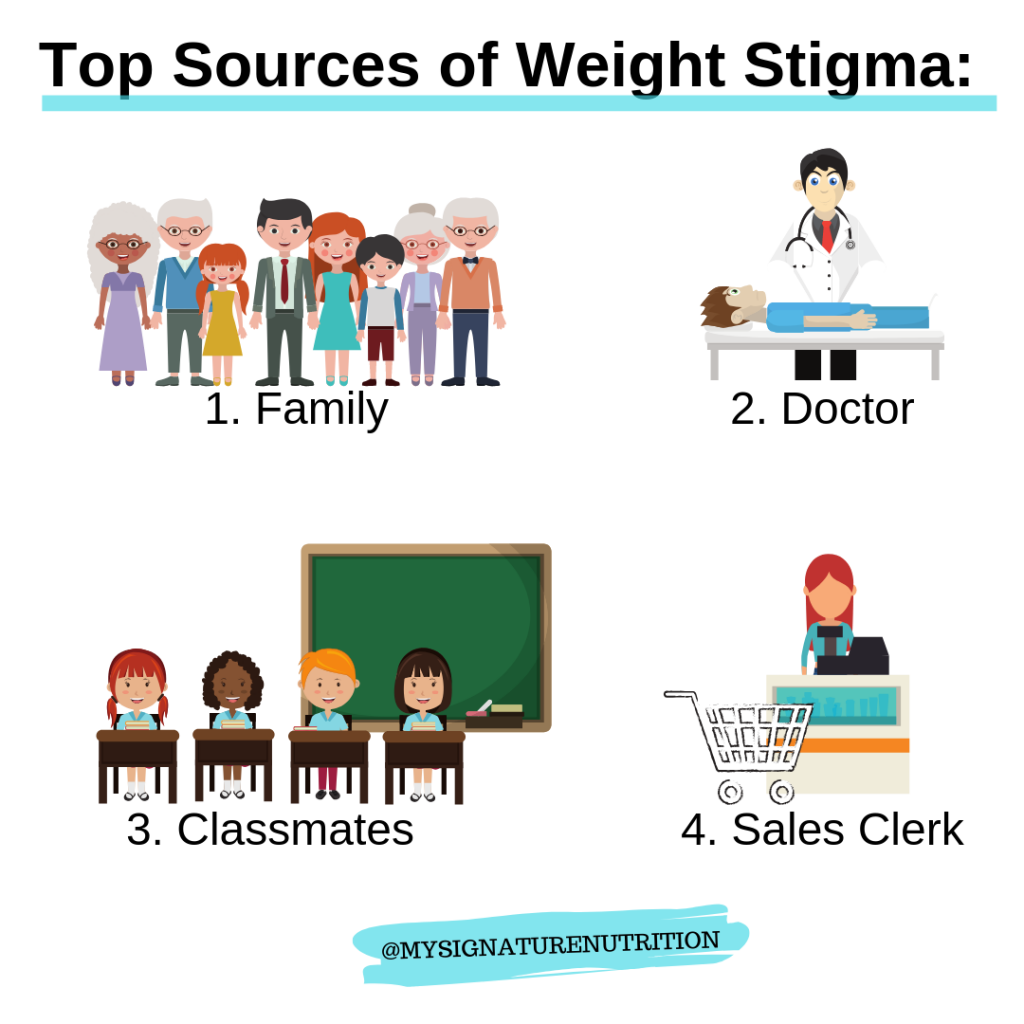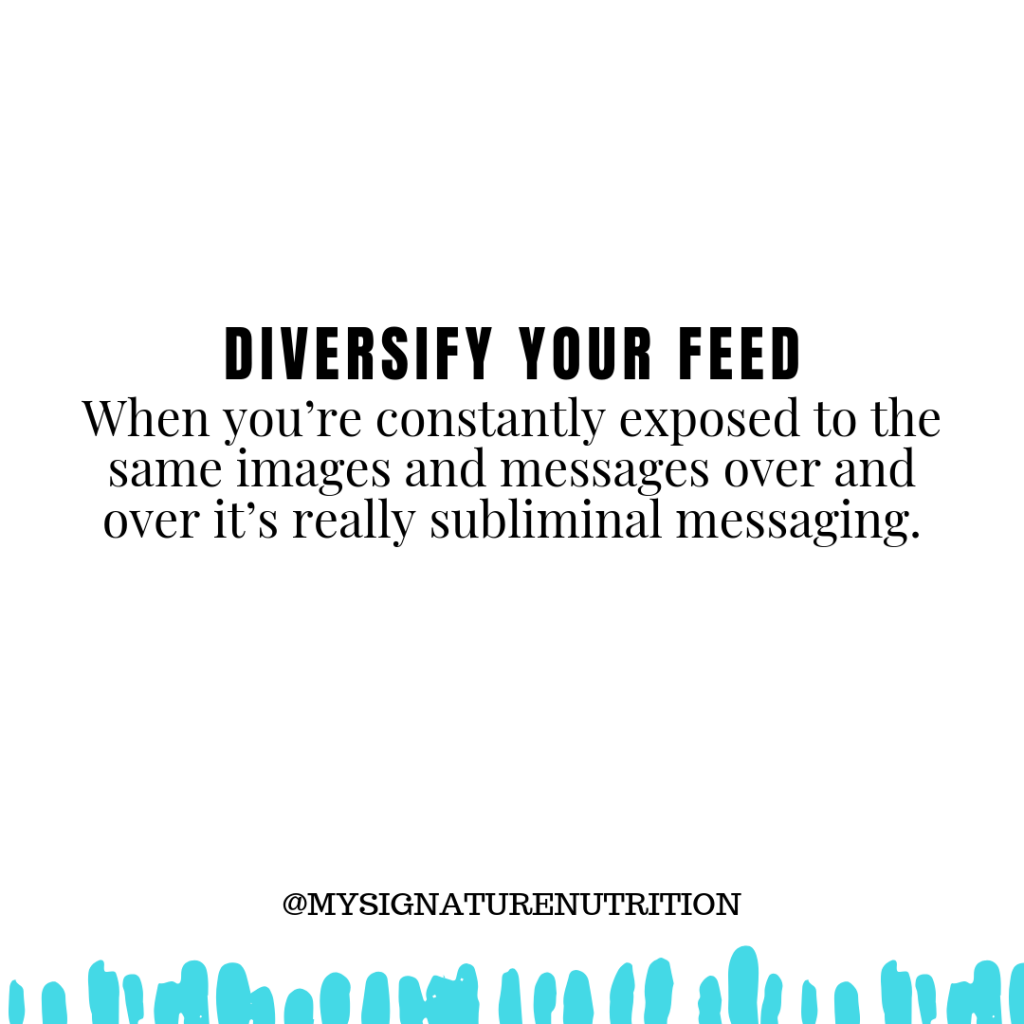What is Weight Stigma
June 4th, 2019 by Sara Upson
Weight stigma is defined as negative thoughts, attitudes, devaluation and social rejection of a person because their body shape or size doesn’t comply with the cultural norms (from diet culture) about what a body “should” look like.
Weight stigma also includes: stereotypes about people who live in larger bodies, bullying and teasing, nasty comments, being stared at, avoided, excluded, ignored or even physically attacked. Weight stigma is weight based prejudice and discrimination.
There are actually several forms of weight stigma including:
Implicit weight stigma. Implicit weight stigma includes internally held attitudes and stereotypes about people who live in larger bodies. Implicit weight stigma impacts an individuals beliefs and actions in an unconscious way- such as making negative assumptions and judgments about what someone eats, how much they exercise, their health, their values and personal attributes.
Explicit weight stigma. Explicit weight stigma includes internally held attitudes and stereotypes that are enacted upon people who live in larger bodies. Explicit weight stigma impacts an individuals beliefs and actions in a consciousway- such as making nasty comments, staring, avoiding, excluding, laughing at, ignoring or even physically attacking someone because of their body shape or size.
Internalized weight stigma. Internalized weight stigma is when an individual believes these negative stereotypes and cultural messages about themselves. For example, think of all the things our culture says about fat people. All the things you think of are examples of implicit bias. IF you believe these things to be true for you- regardless of your body shape or size- this is internalized weight bias. If you act on these thoughts and beliefs against other people who live in larger bodies (such as starting, teasing, laughing, etc) then that is explicit weight bias.
Weight stigma is harmful. It negatively impacts physical and mental health. Research shows that weight stigma leads to anxiety, depression, social avoidance behaviors- avoiding physical activity, avoiding social situations, avoiding going to the doctor, delaying health care, and then receiving lower quality health care- all of which lead to worse health outcomes. A 2015 study by Papadopolous found that “being a target of weight stigma is detrimental to all aspects of health.”

Not only is weight stigma harmful, it’s deadly. Weight stigma kills. A study from 2015 found hat people who reported experiencing weight discrimination had a 60% increased risk of mortality regardless of BMI. (Sutin, 2015). The more people reported experiencing weight based discrimination or were concerned about being stigmatized because of their weight, the poorer their self reported physical health. On top of that, research suggests “that the stigma associated with weight is more harmful than the actual weight itself.” (Papadoplous, 2015).

So what can you do?
1. Make no judgments about a person’s body, their ability, and their character as a person. You cannot tell if someone is healthy or unhealthy by looking at them. You can’t tell if they’re a nice, mean; hard working, lazy; or anything else about them. You can’t tell what they eat or don’t eat or how much they exercise, or any other health behavior. The only thing you can tell by looking at them is your own internalized level of weight bias.
2. Call out weight stigma. I hope it’s obvious- don’t engage in weight stigma- but on top of that- call out weight stigma. Don’t allow people around you to make “fat jokes”, tease, bully, make fun of or laugh at people who live in larger bodies. (And certainly don’t say those comments about yourself.) If someone around you is engaging in this type of talk- let them know that what they’re doing or saying is weight stigma, prejudice or discrimination and that it’s not okay. When you’re together with your friends, let them know you’ll talk about anything except for body bashing and diet talk. Even consider creating a set of “house rules” or a “friend code” that says all bodies are good bodies- or be more specific- this is a diet culture free zone- body talk not allowed.
If someone around you isn’t willing to change, then leave the situation and choose to spend less time with them in the future. Sometimes the worse offenders of weight stigma are family where this isn’t an option (and research actually suggests that family members are the number one source of weight stigma followed by doctors).
It can take many times of restating the same thing over and over before what you’re saying is even heard. This takes tremendous energy and it’s okay if you’re not able to say something at the time, but just need to care for yourself.

3. Fight Fat Phobia. Join the fat acceptance movement. The fat acceptance movement is a social justice movement seeking to eradicate weight stigma by eliminating and raising awareness about weight based discrimination. You can do this by fighting back against weight oppression and working to make the world a safer place for all bodies regardless of race, age, gender identify, sexual orientation, body shape or size, and any other forms of oppression. To learn more, check out these organizations:
ASDAH: The Association for Size Diversity and Health:
NAAFA: the National Association to Advance Fat Acceptance

4. Diversify your feeds and support these folks (listed below). It’s estimated that you’re exposed to around 4,000 to 10,000 ads per day. Now think about the diversity in those ads. Usually there’s very little. When you’re constantly exposed to the same images and messages over and over it’s really subliminal messaging. These images are rooted in diet culture and you end up effectively brainwashing yourself about what you should look like and what you should do. If your social media feed isn’t diverse then it’s even more images. To change this- diversify your social media feed. Here are some resources I love to get you started. **This is a limited list so please add other resources you like (or yourself) in the comments. I’ve included their instagram info and the link to their website.
Jes Baker: @TheMilitantBaker http://www.themilitantbaker.com
Dani Adriana: @IamAdriana https://iamdaniadriana.com
Sonya Renee Taylor: @sonyareneetaylor https://www.sonyareneetaylor.com
Ashlee Bennet: @bodyimage_therapist https://www.bodyimage-therapist.com
Nicole McDermid @theembodiedjourney https://www.theeatingdisordercenter.com/nicole-mcdermid-eating-disorder-recovery-coach.html
Amanda Martinez Beck @your_body_is_good https://amandamartinezbeck.com
Nia Marie @thefriendineverwanted http://thefriendineverwanted.com
Roxane Gay @roxanegay74 http://www.roxanegay.com
Meredith Noble @madeonagenerousplan https://www.generousplan.com
Lindy West @thelindywest www.lindywest.net/
Ragen Chastain @danceswithfat danceswithfat.org
Be Noursished @benourishedpdx https://benourished.org
Lisa DuBreiul @lisajdubreuil http://lisadubreuil.com
Deb Burgard @bodypositivephd http://www.bodypositive.com
Ashley Seruya @cozibae http://ashleymseruya.com
References
Papadopoulos, S. and L. Brennan. “Correlates of weight stigma in adults with overweight and ob*sity A systematic literature review.” Ob*sity 23.9 (2015) 1743-1760.
Sutin, A., Stephan, Y. and Terracciano, A. “Weight discrimination and risk of mortality.” Psychol Sci 26.11 (2015) 1803-1811.






July 03, 2019 at 3:51 pm, 6 Misbeliefs About An Anti-Diet Approach to Stop Believing Right Now! – MySignatureNutrition said:
[…] (from diet culture and a weight centric approach) kills may seem dramatic, but it’s not. Weight stigma leads to a 60% increase in mortality rate, worse health outcomes, and lower quality of… On top of that, a weight centric approach places all the blame on weight so people don’t get […]